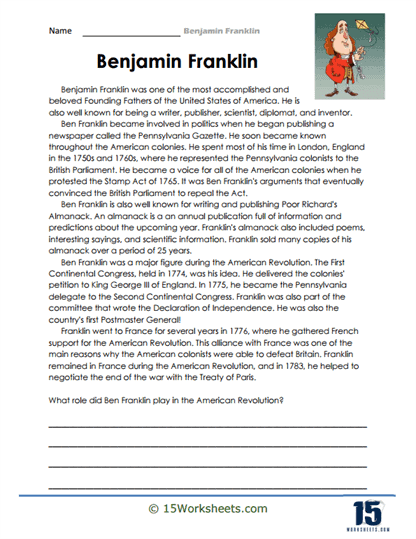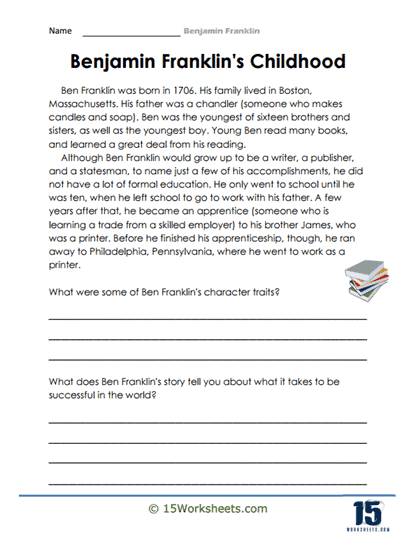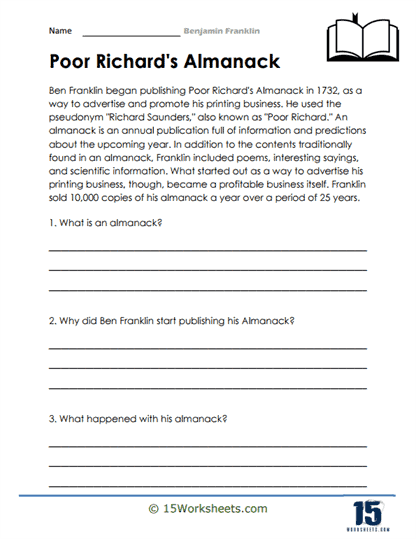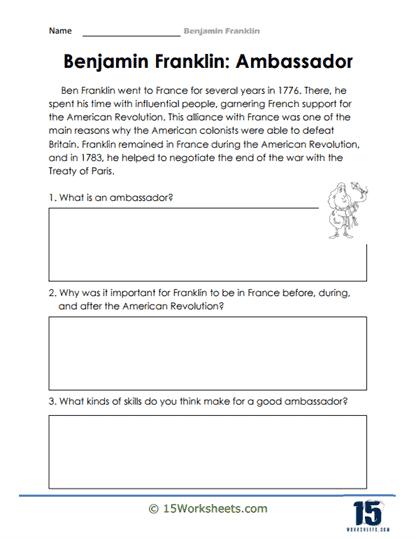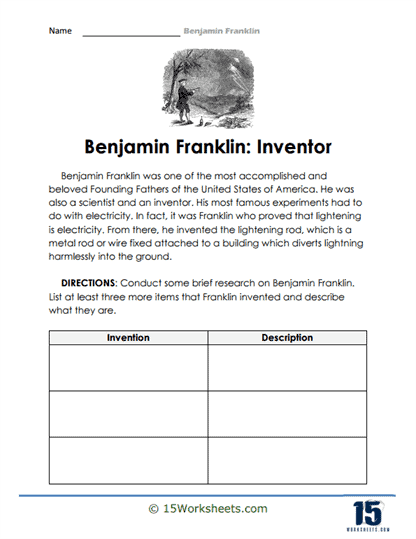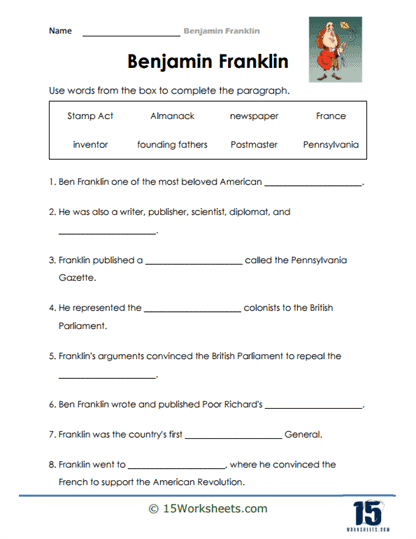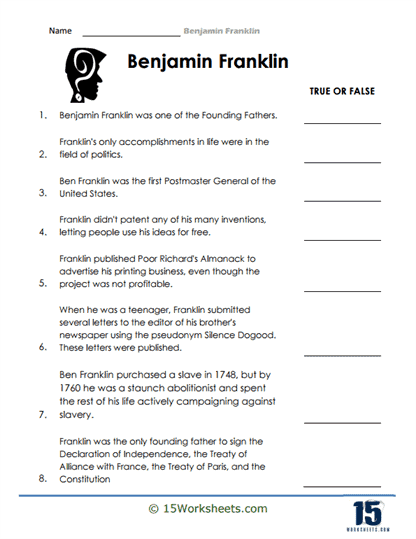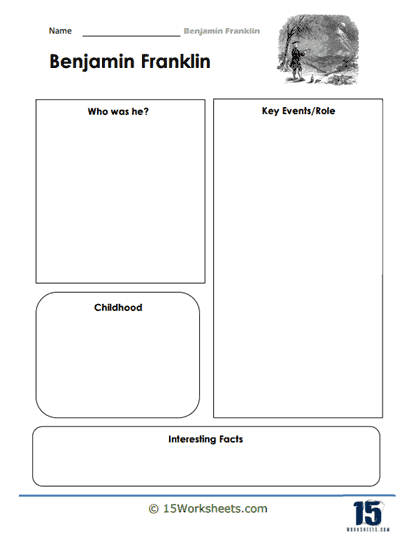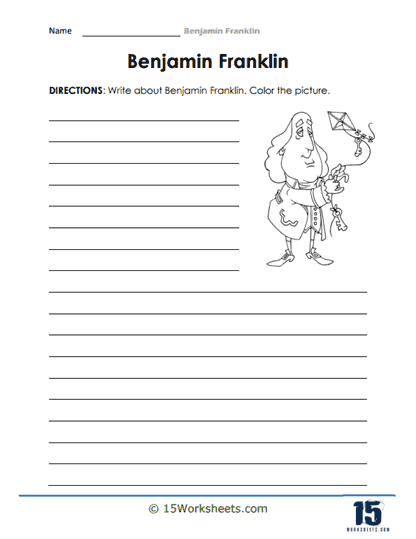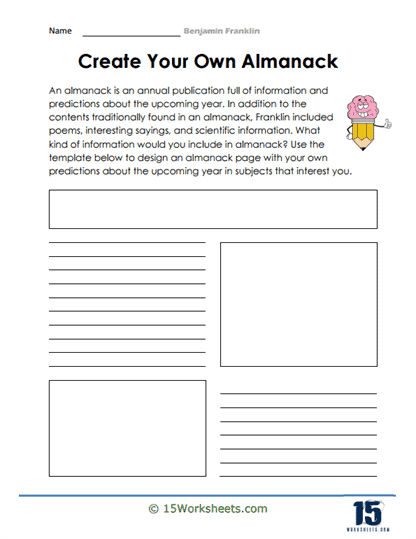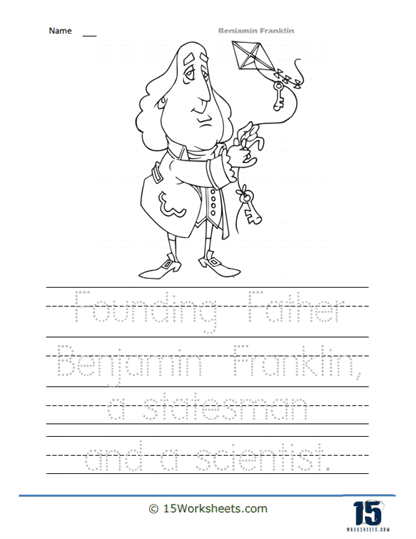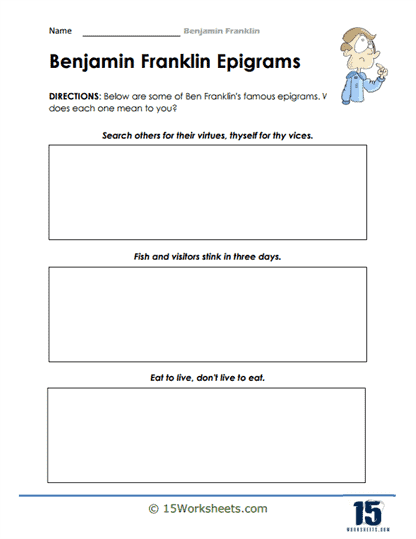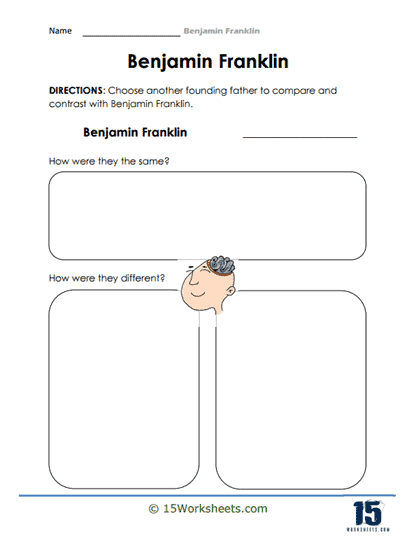Benjamin Franklin Worksheets
All About These 15 Worksheets
Students learn all about the life and achievements of one of America’s founding fathers, Benjamin Franklin, with this comprehensive series of 15 worksheets. This collection is designed to delve into the fascinating world of Benjamin Franklin, exploring his diverse roles as a statesman, inventor, writer, and thinker. Through engaging activities and thought-provoking exercises, students will gain a deeper understanding of Franklin’s contributions to American history and his enduring legacy. By completing these worksheets, students will:
- Explore Ben Franklin’s role in the American Revolution, his childhood, his famous publication Poor Richard’s Almanack, his contributions as an inventor, and more through assigned passages and writing prompts;
- Hone their independent research skills to do a deep dive on the greatest and most notable contributions of Ben Franklin;
- Create an infographic that synthesizes all that they learned;
- Foster their creativity in creating and designing their own almanack;
- Reflect on Ben Franklin’s most famous epigrams and express their own thoughts about them;
- And compare and contrast Ben Franklin with another founding father.
Accomplishing these worksheets will immerse students in the remarkable life and contributions of Benjamin Franklin. Through various activities and thought-provoking exercises, students will develop a deeper understanding of Franklin’s multifaceted role in American history, his enduring legacy, and the values he championed. From his inventions to his writings, Franklin’s impact resonates to this day, making him an essential figure to study and appreciate.
Who Was Benjamin Franklin?
Benjamin Franklin (1706-1790) was an American polymath, statesman, author, scientist, and inventor who played a pivotal role in the founding of the United States. He is often referred to as a “Renaissance man” due to his wide-ranging interests, intellectual curiosity, and significant accomplishments in various fields.
Franklin was born in Boston and began his career as a printer and writer, eventually founding the Pennsylvania Gazette and authoring the famous “Poor Richard’s Almanack.” He was an influential writer and an advocate for various social and political causes, including colonial unity and resistance against British rule.
As a scientist, Franklin was best known for his experiments and discoveries in the field of electricity. His most famous experiment involved flying a kite during a thunderstorm, which demonstrated the electrical nature of lightning. He also invented the lightning rod, which protected buildings from lightning strikes, along with many other practical inventions such as bifocal glasses, the Franklin stove, and the glass armonica.
Franklin was a skilled diplomat and statesman, representing the American colonies in London and later serving as the ambassador to France during the American Revolution. His diplomacy and charm helped secure vital French support, which was crucial to the success of the American cause. After the war, he played an important role in the drafting of the United States Constitution.
Benjamin Franklin was a passionate advocate for education and the establishment of public institutions. He was involved in founding the American Philosophical Society and the University of Pennsylvania, both of which promoted intellectual development and research.
In conclusion, Benjamin Franklin is considered a Renaissance man because of his remarkable achievements in various fields such as science, literature, diplomacy, and invention. His intellectual curiosity, diverse interests, and lasting impact on American society make him an iconic figure in American history.
Benjamin Franklin in the American Revolution
During the American Revolution, Benjamin Franklin played significant roles that contributed to the cause of American independence. Here are some key roles he undertook during this pivotal period:
- Diplomat and Negotiator – Franklin served as a diplomat and negotiator for the American colonies, playing a crucial role in securing foreign support for the American cause. He was appointed as the ambassador to France in 1776, where he successfully sought aid, including military assistance and financial support, from the French government. His diplomatic efforts helped strengthen the American position and played a vital role in securing the eventual victory.
- Founding Father and Signer of Key Documents – Franklin was one of the Founding Fathers of the United States and played an active role in shaping the new nation. He served on various committees and played a significant part in drafting important documents such as the Declaration of Independence, which declared the colonies’ independence from Great Britain.
- Advocate for Unity – Franklin worked to foster unity among the colonies during the Revolutionary War. He was instrumental in establishing the Albany Plan of Union in 1754, which aimed to create a unified colonial government. Although the plan was not implemented, Franklin’s advocacy for unity laid the groundwork for future cooperative efforts among the colonies.
- Propaganda and Influence – Franklin used his skills as a writer and publisher to spread revolutionary ideas and support for independence. He authored persuasive writings and political cartoons that helped shape public opinion and garnered support for the American cause. Franklin’s Poor Richard’s Almanack and other publications disseminated pro-independence sentiments and promoted the values of the American Revolution.
- Scientific Contributions – Although not directly related to the military aspect of the American Revolution, Franklin’s scientific reputation and inventions enhanced his credibility and international standing. His experiments with electricity, including the famous kite experiment, elevated his reputation as a scientist and thinker. This, in turn, bolstered his influence as a diplomat and negotiator during the revolution.
Benjamin Franklin’s roles as a diplomat, statesman, writer, and scientist contributed significantly to the American Revolution. His diplomatic efforts secured vital support from France, his writings influenced public opinion, and his scientific reputation enhanced his credibility on the international stage. Franklin’s contributions were instrumental in achieving American independence and establishing the foundations of the new nation.

